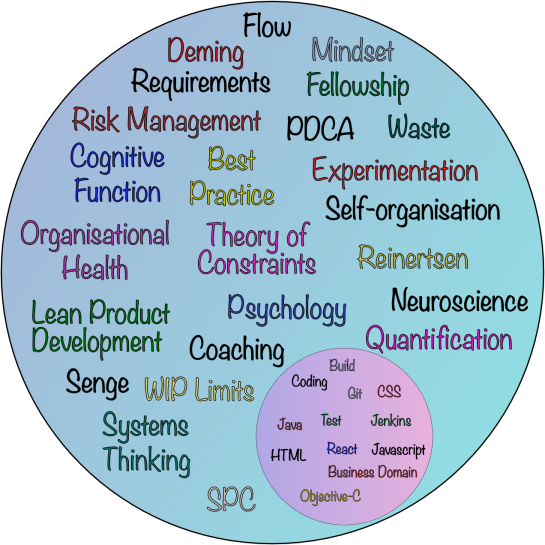How hard to eschew violence when everyone is baying for blood?
Monthly Archives: August 2021
Quickie: Indifference
In the past five years I’ve not come across a single organisation that’s been interested in “world class” – or even in “relatively effective”. I wonder what they ARE interested in?
Quickie: The Great Resignation
In 2019, Gartner reported that “more than half of all HR leaders [agreed] that improving employee experience [was] a priority.” Today, companies are still working to improve employee experiences. “Despite the global attention on and importance of employee experience, only 13% of employees indicate they are currently fully satisfied with their experience,” according to a more recent Gartner report.
Excerpted from https://fortune.com/2021/08/26/pandemic-burnout-career-changes-great-resignation-adobe/
Quickie: Environments for the Brain
If you wanted to create an education environment that was directly opposed to what the brain was good at doing, you would probably design something like a classroom.
~ Dr. John Medina
New Teams
New Teams
Taking on a new role, working with new people. It’s a situation we’ve all experienced, maybe multiple times. And as careers progress, these new roles come with more responsibilities, more scope. Especially in connection with people. We might call these “command” roles. Or at least, “leadership” roles.
And we’ve all experienced, or will experience, the nervousness consequent on preparing to face new colleagues who are almost bound to be sceptical about having a new incumbent as their leader or commander. How to win over these folks? Flattery, favour or folksy friendliness isn’t likely to cut the mustard.
How about showing people that we know what to do with their abilities, expertise and enthusiasm? So they have some confidence that when the chips are down, their efforts won’t be wasted in some doomed enterprise? Here’s a little speech that might play well at the get-go of that new role:
I will never lead you into an action unless I know we can succeed at it. Your job is to become such a brilliant team that there is no action I can’t lead you in to!
We’re not in this for glory, ego-stroking or self-gratification. We are in this to meet the needs of all the folks that matter – any way we can.
– Bob
How Come Hardly Anything Ever Gets Better?
How Come Hardly Anything Ever Gets Better?
“Since everyone was in favor of improvement and opportunities abound, there should be an epidemic of things getting better. That begged the question; why is hardly anything getting better?”
~ Philip Crosby
Who is Responsible for Quality Improvement?
Philip Crosby came up with 3 basic reasons:
- The highest paid and most talented people in a company do not work on improvement. They produce strategy books, planning manuals, marketing reports, five year plans etc that are shown like merit badges but are not used or implemented. Everyone is working hard on things that make little difference.
- People who understand a subject do not get help in determining a policy for improvement. Nationally known consumer advocate groups have no experience in quality management. Most business media experts talk about quality and yet their experience is limited. Getting a common definition of “quality” would be difficult and it has been overlaid with emotion.
- Management and labor do not understand each other. There are very few members of management that have ever actually done the work they supervise. Motivation of the workers is the most popular theme for quality improvementprograms. Yet it is management that needs to realize they are the cause of the problems by the way they manage. Union management falls into the same boat as company executives.
Excerpted from an article about Philip Crosby (and based on his article of the same name).
– Bob
Quickie: Defect Prevention is Cost Effective
“It is much less expensive to prevent errors than to rework, scrap, or service them.”
~ Phil Crosby
From: Merbler, K. (2021). The Entrepreneur Who Created A Business Camelot. Dominionhouse Publishing & Design, LLC.
Quickie: Who’s Right?
“Instead of playing the game ‘Making Life Wonderful’, we often play the game called ‘Who’s Right’. Do you know that game? It’s a game where everybody loses.”
~ Marshall B. Rosenberg
Quickie: Just Call Me Ignaz
Quickie: Quality and Culture
“Improving quality requires an overall culture change, not just a new diet.”
~ Phil Crosby
From: Merbler, Ken. The Entrepreneur Who Created A Business Camelot. Dominionhouse Publishing & Design, LLC. Kindle Edition.
Quickie: If Japan Can, Why Can’t We?
On June 24, 1980, Americans widely viewed a NBC documentary called “If Japan Can… Why Can’t We.” The program, part of NBC’s White Paper series, prominently featured Dr. W. Edwards Deming.
Quickie: The Purpose of Organisations
“The purpose of organizations is to help people have lives.”
~ Phil Crosby
From: Merbler, K. The Entrepreneur Who Created A Business Camelot. Dominionhouse Publishing & Design, LLC. Kindle Edition.
Lucky Thirteen
Lucky Thirteen
It’s been thirteen years now since I first published my work on Rightshifting. In that time, some select few folks have embraced the idea, and incorporated it into their practice.
The industry in general however remains blithely unaware of the idea, and continues to fail to deliver software effectively, on a regular basis. C’est la vie.
In case a recap might assist some folks in better understanding the relevance of the idea, here’s Rightshifting in a nutshell.
At Its Core
Rightshifting explains the factors which contribute to effective software development. If effective software development is not as issue for you, you can safely ignore the idea.
For those for whom effectiveness is of interest, Rightshifting introduces a variant of Lewin’s Equation for the software industry – and collaborative knowledge work in general:
E = 𝑓(Mindset)
Effectiveness is a function of the collective mindset of the organisation developing the software.
Addressing the Root Causes
Equipped with this explanation, those interested in effectiveness can focus of the root causes of the seemingly perennial Software Crisis.
I guess at least one reason folks ignore this explanation of software development effectiveness is that it’s much easier and more lucrative to sell patent medicines than sell an effective treatment of the root causes.
– Bob
Further Reading
Ariely, D. (2009). Predictably Irrational: The Hidden Forces That Shape Our Decisions. Harper Perennial.
Rightshifting and the Marshall Model – Class 101. (2013, September 15). Think Different.
Quickie: Software Deniers
The Software Crisis, like the Climate Crisis, will continue as long as those in charge deny its existence. #Rightshifting
Quickie: Teams
Do sports teams “work” together or “play” together?
And, incidentally, what’s so interesting about team performance when it’s the whole system that’s the kicker?
Quickie: Nonviolence
Oh, if only we had politicians (and business leaders) who understood the power of nonviolence.
Quickie: Evidence-based Practice
Evidence-based practice may be an ethical imperative c.f. Clifford, 1877, but where’s the evidence for its efficacy?
Clifford, W.K. (1877). The Ethics of Belief. Retrieved August 27, 2021, from https://www.people.brandeis.edu/~teuber/Clifford_ethics.pdf
Scope of Ignorance
Scope of Ignorance
Most of the developers and development teams I used to work with when I was a software development consultant had a relatively narrow view of the skills and knowledge necessary to be “competent developers”. Here’s an illustrative graphic:
Generally, to make progress on improving things, and to earn the moniker of “software engineers”, a wider scope of skills and knowledge was necessary. Not only did these development teams lack this wider scope, they were both ignorant of the many additional areas of knowledge and resistant to learning about them. The common response was “What are all these strange topics, and NO WAY! do we need to know about them”:
Aside: Now I’m an Organisational Psychotherapist, their ignorance is no issue – and no stress – for me. They can learn or not learn in their own time. Progress is on them (and their higher-ups).
– Bob
Who Needs the Status Quo?
Who Needs the Status Quo?
SAFe, as an example, does us a great service. No, really! Its relatively wide uptake invites us to ask the question: Why would anyone adopt SAFe when it’s demonstrably useless, not to mention demotivating (for employees) and ruinously expensive?
My answer: People adopt SAFe, or more often, instruct minions to adopt SAFe, because that meets their needs. In particular, it allows the status quo to continue unchanged and unchallenged, under the thinnest of veneers of “doing something about change”. The assumptions and beliefs of the Core Group can remain undisturbed and unexamined.
More generally, the status quo suits many of those who hold positions of influence or control in organisations today. It’s got them to where they are, and provides them with the means to continue serving their own wellbeing. For others – such as the Smart Conservative – the status quo is the least worst alternative in the change game.
Travesties such as SAFe will continue unabated until such time as those in charge find alternative means to better attend to their needs.Until then, the status quo will do nicely, thank you.
– Bob
Further Reading
Obstacles to True Consensus – The Smart Conservative ~ Think Different blog post
Your Real Job ~ Think Different blog post
Obstacles to True Consensus – Summary ~ Think Different blog post
Quickie: Dearest Beliefs
Which beliefs do you hold most dear? Which beliefs are you reluctant to surface, examine, or reconsider, for fear of losing them? Do you have some beliefs which you cannot bring yourself to discuss, even with yourself?


